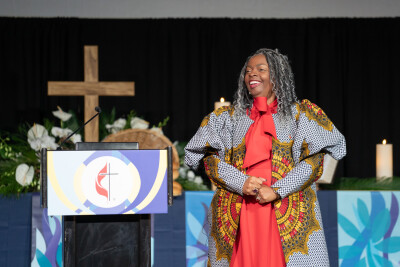Bishop Moore-Koikoi lays out the tools to 'Dwell in Joy'
By Alison Burdett
 Bishop Cynthia Moore-Koikoi resumed her two-day Bible study on Thursday morning. While day one of this Bible study laid out the “scaffolding,” day two examined three scriptural “tools,” from Philippians 4:5-9, that people can use to either stay in a place of dwelling in joy, or get to a place of dwelling in joy.
Bishop Cynthia Moore-Koikoi resumed her two-day Bible study on Thursday morning. While day one of this Bible study laid out the “scaffolding,” day two examined three scriptural “tools,” from Philippians 4:5-9, that people can use to either stay in a place of dwelling in joy, or get to a place of dwelling in joy.
The bishop made a point to note that this does not mean that a good therapist or medication is not needed, but that followers of Christ need to be aware of the tools for good mental hygiene that can be found in the Bible.
In tool #1, “Let your gentleness be known to everyone,” Bishop Moore-Koikoi admitted that in the NRSVUE version, she pictured in her mind someone posting on Facebook, “this is me being gentle.” She offered that the NIV version had a better translation: “Let your gentleness be evident to all,” saying that people shouldn’t have to ask you if you’re gentle and you shouldn’t have to tell them.
To illustrate tool #2: “Let your requests be made known to God,” Bishop Moore-Koikoi shared a story of her nephew during a stage in his young life where he was transitioning from eating with his hands to using utensils. Moore-Koikoi’s sister was letting her son try to eat spaghetti with a spoon. He would get it just to his mouth and then the spaghetti would slip off of the spoon. This happened three times and then, “in his best effort to let his request be made known to God, he said, ‘Jesus keep me near the cross!’”
With a laugh, Bishop Moore-Koikoi stated he could have only learned that from her sister, but that he used it in the exact right context. “To let our requests be made known to God, all we have to do is call on the name of Jesus,” she said.
The conference learned a Greek word to better understand tool #3: “Think on these things.” The Greek word, logizomai, means “to count these things, regard, consider, realize, claim, expect, and record these things.”
Bishop Moore-Koikoi realized that her love of biking helped her recognize the difference between attending to the traumas in our lives rather than dwelling on them.
“When you’re riding a bike,” she said, “you’re paying attention to and attending to the hazards on the road. You have to have a plan to deal with them, you need to focus on it, once you go past them, you focus on the road ahead.
“So, by the end of the ride, I cannot tell you about all the potholes of my ride,” she noted. She further illustrated this, saying that she doesn’t “pull over to rest or to dwell where there’s a hazard. I keep moving until I see a place that is lovely, that is beautiful, and that is where I rest. That’s where I dwell, linger, until my body gets enough restoration that I’m ready to get back on the path and face some more trauma.”
The bishop shared about a time where she couldn’t avoid biking over a pair of snakes. She let her request be made known to God as she lifted her feet and said, “Jesus help me!” She said that she made it over the snakes, and had to confess she did dwell in that moment for a while, but now it brings her joy as she dwells in that moment.
Another time, when caught in a rainstorm with her friend, the Rev. Dawn Hand, she told the bishop they had to keep moving, that they can’t stay in the storm. Hand supported her weary friend, telling her, “Dig deep, Bishop! Dig deep!”
Bishop Moore-Koikoi returned the favor, asking the congregation to shout back to Hand, who is going through her own trauma with her health.
“Dig deep, Dawn! Dig deep!” echoed throughout the plenary session and through the livestream. Hand, who lives in North Carolina, sent a message of appreciation back later in the day that was shared on the screen.
Bishop Moore-Koikoi concluded her Bible study, emphasizing, “How we show up says to the world who God is. Dwelling in joy can be recovery and sight to the blind, liberation to the oppressed, bring hope to a young person who has no hope.” So do your work, she said, and use your tools, because it matters.
